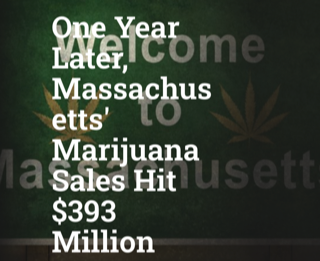
November 27, 2019
By Kaitlin Domangue
A year has passed since Massachusetts began sales its sale of legal adult-use cannabis and while the state showed no interest in rushing the matter, customers showed their interest as they rushed to the stores.
It was a long road to get there. Massachusetts voters said yes to Question 4 in November of 2016, effectively legalizing cannabis for adult recreational use. In 2017, Gov. Charlie Baker signed a bill changing the law, successfully setting back the start of recreational sales by six months. After many other snags, the state’s Cannabis Control Commission finally approved key regulations in March of 2018. By October of 2018, just four cannabis shops had their licenses approved, with only two being open at the time of Massachusetts’ launch of retail cannabis sales.
In 2017, the Massachusetts Department of Revenue had estimated that the state could collect anywhere between $44 million and $82 million in marijuana tax revenue in the fiscal year of 2019. Those estimates were based on what the state described as a “reasonable number” of dispensaries, which all admit was much lower than hoped and the DOR scaled back those original estimates.
The program got off to a good start. Customers spent $2.2 million in the first five days of sales, with $440,000 being spent on the first day. The total number of units sold was 56,380, with an average price per unit of $39.33.

One year later, the state reported that licensees generated $393.7 million in gross sales and that 33 dispensaries had been licensed. The customer demand is high, but the inventory is low. There aren’t many licensed cultivators in the state of Massachusetts, leaving little room for excess. Because the state has been slow to license businesses, only two testing facilities are in operation throughout the entire state, causing additional issues for dispensaries.
“AmeriCann recognized years ago that Massachusetts was positioned to become one of the strongest cannabis markets in the country,” stated AmeriCann CEO Tim Keogh. “We expect to play an important role in providing much-needed cannabis going forward, with the recent completion of our initial building at our Massachusetts Cannabis Center development.” Building 1 at the MCC development is a 30,000 square foot cultivation and processing facility, 100 percent of which will be occupied by Bask, Inc., an existing Massachusetts licensed vertically integrated cannabis operator.
“Marijuana Retailers and consumers should be commended for participating in an extremely smooth rollout of the legal adult-use cannabis industry in Massachusetts for the first year,” Commission Chairman Steven J. Hoffman said. “Hundreds of millions of dollars in sales are one measure of success, but I am even prouder of the way in which Marijuana Establishments have worked with the Commission to gain and preserve compliance with our regulations and patrons continue to inform themselves about the law and their responsibilities when they visit Massachusetts stores.” The state also said that another 54 Retailers with provisional or final license approval are in the process of completing the Commission’s inspection and compliance procedures towards that end.
Canaccord Genuity senior analyst Bobby Burleson said, “Massachusetts has been a slower rollout than people had hoped originally. There were a lot of stale expectations out there. It was certainly partially due to the slowdown in Massachusetts, but also the immaturity of the cannabis sector as a public sector. The companies might have been dealt with better if they had more history.”
Burleson went on to say that additional operators are getting licenses and more dispensaries are opening closer to population centers like Brookline and Newton, which are suburbs of Boston. “We are increasing our 2019 estimate to approximately $600 million from $578 million. By 2022 we continue to forecast Massachusetts sales to exceed $1.2 billion.”
Some companies like Sland Worldwide (SLNG) scaled back its efforts in the state as the program launch crawled at glacier speed. Still, others remained committed and are in for the long game. The state hasn’t reported the amount of taxes that were collected for the first year.
Retrieved from: https://www.greenmarketreport.com/one-year-later-massachusetts-marijuana-sales-hit-393-million/
